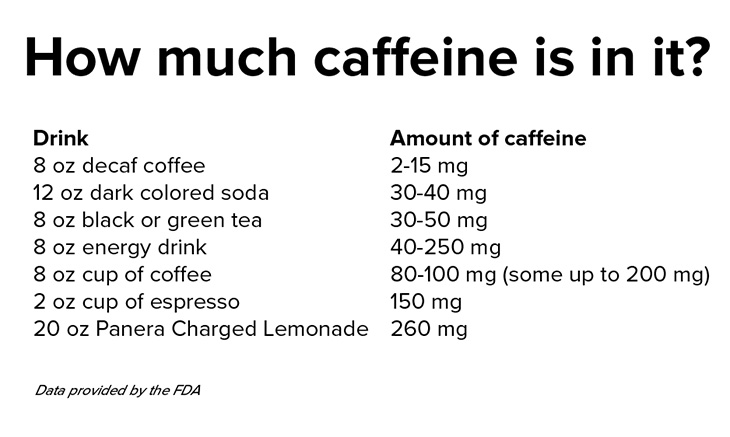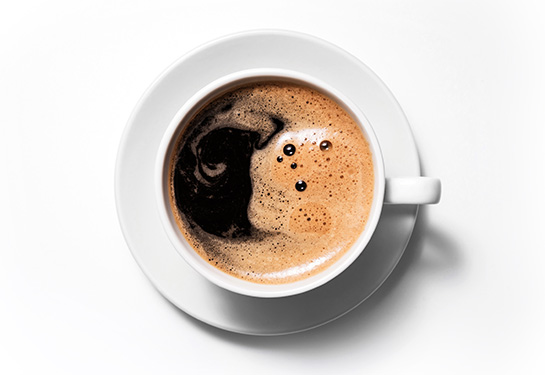Q&A: What effect does caffeine have on your heart?
UC Davis Health cardiology experts answer questions about caffeine consumption and cardiovascular health
Two high-profile lawsuits claim that a restaurant chain’s caffeinated lemonade led to the deaths of two individuals with heart conditions.
The wrongful death suits allege both individuals consumed Panera Bread’s “Charged Lemonade” and did not realize the amount of caffeine in the drink, since it was not advertised as an energy drink, which are known for high levels of caffeine.
To better understand the effect caffeine can have on your heart, UC Davis Health cardiology experts Jeffrey Southard, associate clinical professor of interventional cardiology, and Margaret Junker, registered dietician for cardiology, answered questions about caffeine consumption and cardiovascular health.
What happens to the heart when you consume caffeine?
Drinking caffeine promotes the release of noradrenaline and norepinephrine which can increase heart rate and blood pressure in some individuals. For most people this is well tolerated, but for others it may lead to palpitations or extra beats from the heart.
Caffeine may be linked to atrial fibrillation in susceptible individuals, which could bring about a rapid heart rate with sustained consumption or a large amount of caffeine. Some studies suggest the risk of atrial fibrillation lessens over time with coffee consumption.
Is it safe for people with a heart condition to consume caffeine?
Most people with heart disease can safely consume a small amount of caffeine such as a cup of coffee per day.
People prone to atrial fibrillation or fast heart rates may see an increase in their heart rate with consumption. In addition, those prone to chest pain from blocked coronary arteries may experience chest pain at higher heart rates due to more stress on the heart (similar to running on a treadmill).
Many individuals do not see an increase in heart rate with caffeine intake, especially those who drink caffeinated beverages routinely. For them, there is no inherent medical risk in consuming caffeine.
But people with serious heart rhythm disorders should avoid caffeine as it may worsen their condition.
How much is too much caffeine?
It depends on the person. The Food and Drug Administration (FDA) indicates healthy adults can drink four to five cups of coffee without harm. Pregnant and lactating women should limit their consumption to two to three cups a day and the American Academy of Pediatrics warms children and adolescents to avoid caffeine.
As with most food and beverages, recommendations should be individualized based on overall health, chronic conditions and medications.
Can you overdose on caffeine?
Caffeine overdose is rare. Usually with doses over one gram we may feel anxious and nervous. Some people may experience insomnia, digestive issues and fatigue.
Most people who overdose on caffeine consume pills or powders which contain much higher levels of caffeine. Lethal doses are usually over 10 grams. Symptoms begin with nausea and vomiting, high blood pressure and elevated heart rate. If large amounts are consumed in pills or powder, emergency care may be necessary to prevent a fatal outcome.

What foods or drinks have caffeine in them?
Aside from coffee, there are many foods and drinks that people would be surprised to know contain caffeine. Some of them are:
- Chocolate and foods containing chocolate (ex. chocolate pudding or brownies)
- Many coffee-flavored foods like mocha ice cream
- Dark-colored sodas and some light-colored sodas such as Mountain Dew
- Various energy drinks, including Rockstar, Monster, Prime or Gatorade Fast Twitch
- Energy bars
- Dietary supplements marketed for energy and/or weight loss
- Decaffeinated coffee (it still contains caffeine, but only a small amount)
- Most packaged foods that state the words “energy” or “charged”
Do you have any tips for lowering your caffeine intake?
People trying to quit or reduce their caffeine habit should start gradually. For example, drink one fewer can of soda or drink a smaller cup of coffee each day.
Another option is to choose green tea over other caffeinated beverages, since it has less caffeine content and more health benefits.
If you still find yourself reaching for coffee or energy drinks to get through the day, evaluate your daily stressors and schedule. Lifestyle improvements instead of additional caffeine may be what you really need. We recommend drinking plenty of water, completing at least 150 minutes of physical activity per week and practicing meditation – or positive self-talk.

